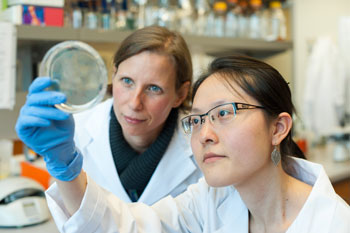Megan Levings, Associate Professor in the Department of Surgery, is co-leading a clinical trial that aims to improve long-term survival and quality of life for transplant patients.
Working with Denis-Claude Roy of the University of Montreal, they will take a technology developed to improve stem cell transplantation and apply it to kidney transplants, with the goal of reducing the need for immune-suppressant drugs.
Currently, most transplant recipients have to take immunosuppressant drugs for the rest of their lives, and often with significant side effects such as graft-versus-host disease, heart problems, or cancer.
The clinical trial, supported by the Canadian Institutes of Health Research and Genome BC, will be managed through the transplant programs at Vancouver General Hospital and St. Paul’s Hospital.
Dr. Levings’ and Dr. Roy’s investigation also will conduct basic science research to develop a new cell-based therapy to prevent graft rejection for both stem cell and solid organ transplantation.
The trials are part of the new Canadian National Transplant Research Program, which is receiving $13.9 million from the Canadian Institutes of Health Research and other partners, such as Genome BC.
The Transplant Research Program also is supporting another B.C.-led project, directed by Kirk Schultz, Professor in the Division of Hematology and Oncology in the Department of Pediatrics.
Dr. Schultz’s team will create a national platform to support clinical trials, a national transplant registry effort and a national effort to link biological samples with patient outcomes. The registry data will enable researchers to develop better tests to identify the risk of rejection and infection, among other clinical applications.
The B.C.-led transplant projects are receiving a total of $3 million from CIHR and another $1 million from Genome BC.
